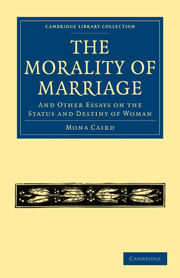PART III - THE END OF THE PATRIARCHAL SYSTEM
Published online by Cambridge University Press: 16 May 2011
Summary
“In the case of women, each individual of the subject class is in a chronic state of bribery and intimidation combined, … if ever any system of privilege and enforced subjection had its yoke tightly rivetted on the necks of those who are kept down by it, this has.”
—John Stuart Mill.One of the most striking features of modern life is the position which the individual takes as unit of society. In former days the family occupied that post. Yet this change was rendered half futile, because only male individuals were able to assume this independence. The woman must on no account be accepted as a free individual. Meanwhile, civilised communities were organised more and more on the individualistic basis, leaving the woman without the protection which she used to enjoy under the old group system, while refusing to give her the compensating advantages of the new order. She lost security without gaining freedom. She still suffered every sort of disability, legal and social; yet there was now no certainty of support, no absolute legal claim which would keep her safe from the rush and scramble of the modern world. It is obvious that in a struggle where many succumb even when suffering no artificial disabilities, the addition of these to the burden makes the handicap almost hopeless.
- Type
- Chapter
- Information
- The Morality of MarriageAnd Other Essays on the Status and Destiny of Woman, pp. 51 - 60Publisher: Cambridge University PressPrint publication year: 2010First published in: 1897



